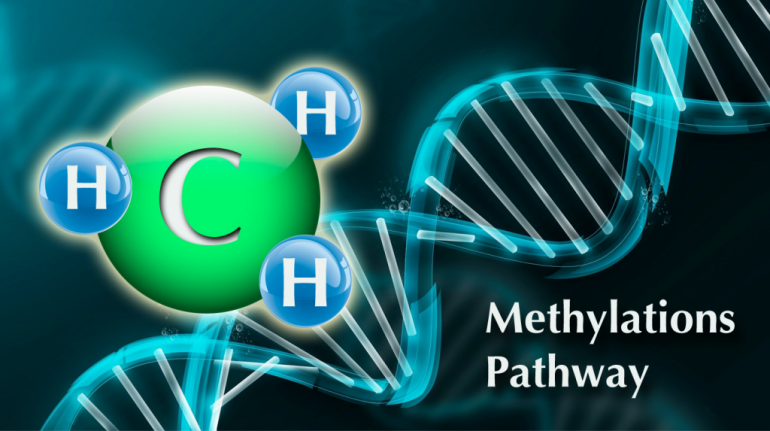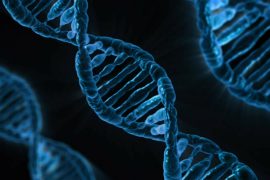Methylation is a critical process that happens trillions of times in every cell each minute. It is one of the most essential metabolic functions of the body and is dependent upon a variety of enzymes. Adapting to stress and the challenges of life is an aspect that methylation provides the body. Without adequate methylation processes the individual cannot adapt effectively and will suffer the delirious effects of accelerated aging (1).
Methylation is a controlled transfer of a methyl group (one carbon and three hydrogen atoms) onto proteins, amino acids, enzymes and DNA in every cell and tissue of the body to regulate healing, cell energy, genetic expression of DNA, liver detoxification, immunity and neurology.
Inadequate Methylation Symptoms:
Cardiovascular Disease (2) Diabetes (3)
Multiple Sclerosis (4) Psychiatric Disorders (5)
Chronic Inflammation (6) NeuroTransmitter Imbalances (7)
Abnormal Immune Function (8) Dementia (9)
Autism (10) Fertility & Miscarriages (11)
Cancer (12) Chronic Fatigue (13)
Alzheimers (14) Down’s Syndrome (15)
Pregnancy Problems (16)
Why is Methylation Important for Health?
Methylation is involved in almost every bodily biochemical reaction, and occurs billions of times every second in our cells. That’s why figuring out where there are challenges in the cycle and how to help it perform better will significantly improve our health.
There are many key functions of methylation, for example methylation is intimately involved in all of the following processes:
Turn on and off genes (gene regulation) – this is important in cancer for example (17)
Process chemicals and toxins (bio transformation) helping to reduce our toxic load (18)
Builds neurotransmitters (dopamine, serotonin, epinephrine) (19)
Processes and metabolizes hormones (estrogen) (20)
Build immune cells (T cells and NK cells) (21)
Synthesis of DNA and RNA (thymine is formed from uracil) (22)
Produce energy (CoQ10, Carnitine and ATP) (23)
Produce protective coating on our nerves (via myelination) (24)
What Influences the Methylation Process?
Methylation is regulated by key enzymes and cofactors for activation (25). This process is dependent upon certain vitamins and minerals. When we are deficient in the necessary substrates and cofactors it compromises the methylation processes.
There are many key nutrients that play a role in methylation. These include zinc, magnesium, B2, B6, folate, B12, niacin and others (26). Many people consume diets that are deficient or deplete their bodies of these key nutrients. Other individuals have genetic polymorphisms that reduce their ability to absorb and utilize these nutrients (27).
Medications such as birth control pills, NSAID’s and antacids deplete these nutrients and consume massive quantities of methyl groups for proper detoxification. Heavy metal exposure, chronic infections, alcohol consumption and heavy emotional stress also deplete methyl groups and put us at risk (28, 29).
Testing for Methylation Imbalances:
Methylation imbalances are often not considered by most doctors and health coaches. Most health care practitioners and health coaches have little to no education in methylation. Those who are well educated in this subject are the premium when it comes to getting to the underlying cause of your health problems.
Specific blood work can evaluate the plasma levels of methionine, cysteine, SAMe, SAH, Homocysteine and cystathione. These tests also give the important “methylation index” (ratio of SAMe to SAH). The results of this test can guide the nutritional support to improve methionine metabolism, reducing homocysteine and the consequences of inadequate methylation and transsulfuration capacity (30).
Genetic Influences and on Methylation:
Genetic variations play a very important role in the methylation process. The prescence of SNP (single nucleotide polymorphisms) is often a major factor in identifying the underlying cause of imbalanced methylation. A SNP may be present in one or both of the genes. When it is present on one of the genes it is called a heterozygous polymorphism and when it is on both of the genes it is a homozygous polymorphism.
Every part of the methylation pathway can be influenced by SNP’s. The most popular and well-studied one is MTHFR or methylenetetrahydrofolate reductase. This enzyme converts 5,10 methylene Tetrahydrofolate to 5-methyltetrahydrofolate (5 methyl THF). 5-methyl THF then passes its methyl group to hydroxyl-B12. Hydroxy-B12 then becomes methyl B12 by methylating homocysteine. This process converts a potentially dangerous substance (homocysteine) into a very important molecule called SAMe.
MTHFR Polymorphisms:
There are two key MTHFR polymorphisms – A1298C and C677T. The effect these have on the methylation cycle and overall health are different between the two. C677T SNP’s are associated with elevated homocysteine levels (31). Elevated homocysteine is a major risk factor for heart disease and neurodegenerative states such as Alzheimer’s disease (32, 33).
A1298C SNP’s do not lead to elevated homocysteine but instead play an important role in neurotransmitter function. The 1298C is important in the conversion of BH2 to BH4 which plays a huge role in mood regulation and addictive behavior (34).
Nutrigenomics and 21st Century Health
The field of Nutrigenomics or the science of how nutrition interacts with our genes is revolutionizing our understanding of how to apply specific supplementation to meet an individual’s needs. As we continue to develop our understanding of these SNP’s and the methylation cycle we will be even better at addressing the underlying cause of variant health issues.
Epigenetics is a term that is used to identify how the environment interacts with our genes. Epigenetic research has shown that our environment can change our genetic structure far beyond what we inherited from our parents. Our lifestyle habits, environmental conditions and toxic exposure can change our genes to the point where those changes are passed onto our offspring (35).
One supplement that I use for special cases in need of methylation is Methyl Power. Check it out here
Sources For This Article Include:
- Weidner CI, Lin Q, Koch CM, Eisele L, Beier F, Ziegler P, Bauerschlag DO, Jöckel KH, Erbel R, Mühleisen TW, Zenke M, Brümmendorf TH, Wagner W. Aging of blood can be tracked by DNA methylation changes at just three CpG sites. Genome Biol. 2014 Feb 3;15(2):R24. PMID: 24490752
- Guay SP, Légaré C, Houde AA, Mathieu P, Bossé Y, Bouchard L. Acetylsalicylic acid, aging and coronary artery disease are associated with ABCA1 DNA methylation in men. Clin Epigenetics. 2014 Jul 29;6(1):14. PMID: 25093045
- Tang L, Wang L, Ye H, Xu X, Hong Q, Wang H, Xu L, Bu S, Zhang L, Cheng J, Liu P, Ye M, Mai Y, Duan S. BCL11A gene DNA methylation contributes to the risk of type 2 diabetes in males. Exp Ther Med. 2014 Aug;8(2):459-463. PMID: 25009601
- Graves M, Benton M, Lea R, Boyle M, Tajouri L, Macartney-Coxson D, Scott R, Lechner-Scott J. Methylation differences at the HLA-DRB1 locus in CD4+ T-Cells are associated with multiple sclerosis. Mult Scler. 2013 Dec 12;20(8):1033-1041. PMID: 24336351
- Dell’Osso B, D’Addario C, Carlotta Palazzo M, Benatti B, Camuri G, Galimberti D, Fenoglio C, Scarpini E, Di Francesco A, Maccarrone M, Altamura AC. Epigenetic modulation of BDNF gene: differences in DNA methylation between unipolar and bipolar patients. J Affect Disord. 2014 Sep;166:330-3. PMID: 25012449
- Pan Z, Zhu LJ, Li YQ, Hao LY, Yin C, Yang JX, Guo Y, Zhang S, Hua L, Xue ZY, Zhang H, Cao JL. Epigenetic modification of spinal miR-219 expression regulates chronic inflammation pain by targeting CaMKIIγ. J Neurosci. 2014 Jul 16;34(29):9476-83. PMID: 25031391
- Alelú-Paz R, González-Corpas A, Ashour N, Escanilla A, Monje A, Guerrero Márquez C, Algora Weber M, Ropero S. DNA methylation pattern of gene promoters of major neurotransmitter systems in older patients with schizophrenia with severe and mild cognitive impairment. Int J Geriatr Psychiatry. 2015 Jun;30(6):558-65. PMID: 25044034
- Simar D, Versteyhe S, Donkin I, Liu J, Hesson L, Nylander V, Fossum A, Barrès R.Metabolism. DNA methylation is altered in B and NK lymphocytes in obese and type 2 diabetic human. 2014 Sep;63(9):1188-97. PMID: 24996265
- Pezzi JC, Ens CM, Borba EM, Schumacher-Schuh AF, de Andrade FM, Chaves ML, Fiegenbaum M, Camozzato AL. DNA methyltransferase haplotype is associated with Alzheimer’s disease. Neurosci Lett. 2014 Sep 5;579:70-4. PMID: 25038421
- Lesseur C, Paquette AG, Marsit CJ. Epigenetic Regulation of Infant Neurobehavioral Outcomes. Med Epigenet. 2014 May;2(2):71-79. PMID: 25089125
- Consales C, Leter G, Bonde JP, Toft G, Eleuteri P, Moccia T, Budillon A, Jönsson BA, Giwercman A, Pedersen HS, Ludwicki JK, Zviezdai V, Heederik D, Spanò M. Indices of methylation in sperm DNA from fertile men differ between distinct geographical regions. Hum Reprod. 2014 Sep;29(9):2065-72. PMID: 25035434
- Lindqvist BM, Wingren S, Motlagh PB, Nilsson TK. Whole genome DNA methylation signature of HER2-positive breast cancer. Epigenetics. 2014 Aug;9(8):1149-62. PMID: 25089541
- Paquette AG, Marsit CJ. The developmental basis of epigenetic regulation of HTR2A and psychiatric outcomes. J Cell Biochem. 2014 Dec;115(12):2065-72. PMID: 25043477
- Coppedè F. The potential of epigenetic therapies in neurodegenerative diseases. Front Genet. 2014 Jul 14;5:220. PMID: 25071843
- Iacobazzi V, Infantino V, Castegna A, Andria G. Hyperhomocysteinemia: related genetic diseases and congenital defects, abnormal DNA methylation and newborn screening issues. Mol Genet Metab. 2014 Sep-Oct;113(1-2):27-33. PMID: 25087163
- Anderson CM, Ralph JL, Johnson L, Scheett A, Wright ML, Taylor JY, Ohm JE, Uthus E. First trimester vitamin D status and placental epigenomics in preeclampsia among Northern Plains primiparas. Life Sci. 2015 May 15;129:10-5. PMID: 25050465
- Epigenomics – Link Here
- Baccarelli A, Bollati V. Epigenetics and environmental chemicals. Current opinion in pediatrics. 2009;21(2):243-251.
- Miller AL. The methylation, neurotransmitter, and antioxidant connections between folate and depression. Altern Med Rev. 2008 Sep;13(3):216-26. PMID: 18950248
- Widschwendter M, Siegmund KD, Müller HM, Fiegl H, Marth C, Müller-Holzner E, Jones PA, Laird PW. Association of breast cancer DNA methylation profiles with hormone receptor status and response to tamoxifen. Cancer Res. 2004 Jun 1;64(11):3807-13. PMID: 15172987
- DNA Methylation Regulates Differentiation of Naive Immune Cells into Effector Cells Link Here
- RNA-directed DNA methylation: an epigenetic pathway of increasing complexity Link Here
- Global DNA methylation levels are modulated by mitochondrial DNA variants. Link Here
- Kim S, Lim IK, Park GH, Paik WK. Biological methylation of myelin basic protein: enzymology and biological significance. Int J Biochem Cell Biol. 1997 May;29(5):743-51. PMID: 9251242
- Malanovic N, Streith I, Wolinski H, Rechberger G, Kohlwein SD, Tehlivets O. S-adenosyl-L-homocysteine hydrolase, key enzyme of methylation metabolism, regulates phosphatidylcholine synthesis and triacylglycerol homeostasis in yeast: implications for homocysteine as a risk factor of atherosclerosis. J Biol Chem. 2008 Aug 29;283(35):23989-99. PMID: 18591246
- Choi SW, Friso S. Epigenetics: A New Bridge between Nutrition and Health. Adv Nutr. 2010 Nov;1(1):8-16. PMID: 22043447
- Pongtheerat T, Pakdeethai S, Purisa W, Chariyalertsak S, Petmitr S. Promoter methylation and genetic polymorphism of glutathione S-transferase P1 gene (GSTP1) in Thai breast- cancer patients. Asian Pac J Cancer Prev. 2011;12(10):2731-4. PMID: 22320983
- Huffington Post – The Nutritional Cost of Birth Control Pills Link Here
- A Practical Guide to Avoiding Drug-Induced Nutrient Depletion Link Here
- Methylation Index Link Here
- MTHFR Link Here
- NIH – High Homocysteine Levels May Double Risk of Dementia, Alzheimer’s Disease, New Report Suggests Link Here
- Wierzbicki AS. Homocysteine and cardiovascular disease: a review of the evidence. Diab Vasc Dis Res. 2007 Jun;4(2):143-50. PMID: 17654449
- MTHFR A1298C Polymorphism Link Here
- Lim U, Song MA. Dietary and lifestyle factors of DNA methylation. Methods Mol Biol. 2012;863:359-76. PMID: 22359306
About the author:
 Dr. David Jockers is a Maximized Living doctor, functional nutritionist, corrective care chiropractor, exercise physiologist, and certified strength and conditioning specialist. His mission is to inspire and empower as many people as possible to reach their full health potential.
Dr. David Jockers is a Maximized Living doctor, functional nutritionist, corrective care chiropractor, exercise physiologist, and certified strength and conditioning specialist. His mission is to inspire and empower as many people as possible to reach their full health potential.
He currently owns and operates Exodus Health Center in Kennesaw, Georgia. He is also the author of the best-selling book “SuperCharge Your Brain” the complete guide to radically improve your mood, memory and mindset.
This article is shared with permission from our friends at Dr. Jockers’ .















